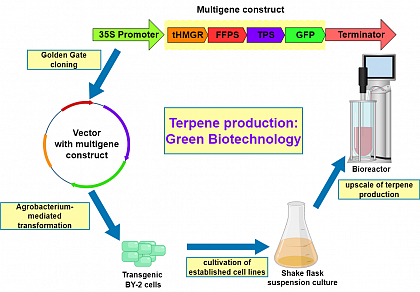Terpene production by green biotechnology
Luca J. Meink, Manish L. Raorane
Plants have evolved a sophisticated immune system, relying on a vast array of defensive chemicals. These compounds, often with pharmacological properties, have piqued interest as drug candidates. Terpenes, a class of natural products, are particularly prominent in this regard.
A major hurdle in producing plant secondary metabolites in vitro is the complexity of their biosynthetic pathways. Chemical synthesis is often impractical due to the intricate structures and stereochemistry of these compounds. While metabolic engineering has shown promise, it's often limited in its success.
Heterologous systems like E. coli and yeast have been explored for terpene production, but they face challenges in reconstituting entire pathways. Plant cell cultures, on the other hand, offer a more natural environment for complex metabolic processes.
Our research utilizes the tobacco BY-2 cell line to engineer terpene production. We have successfully created a monoterpene-producing cell line, but current yields are insufficient. Large-scale bioreactors hold the potential to address this by increasing productivity, yield, and product concentration. However, industrial-scale production of plant secondary metabolites remains a significant challenge, with limited examples like paclitaxel.
Our long-term goal is to establish BY-2 cells as a reliable platform for terpene biosynthesis, paving the way for industrial applications.





